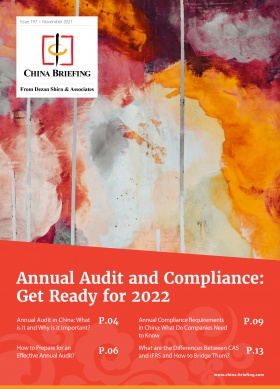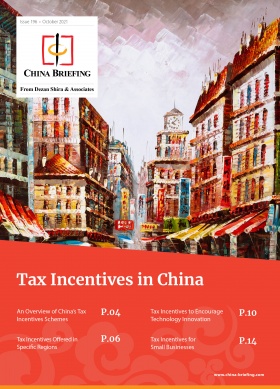What to Make of the New Regulations in China’s Gaming Industry
China introduced new rules impacting the online gaming time allowed for minors end of August. Further, September witnessed regulatory moves and information from authorities – indicative of new red lines on gaming contents. Cumulatively, these set to change how international players operate in China’s gaming market.
Update: It has been reported in Chinese media that the National Press and Publication Administration (NPPA) is set to begin approving licenses for online video games over the next few weeks after a four-month suspension in 2021. The NPPA has not released its list of newly licensed games since July 22, 2021. Industry executives expect the approvals process to be highly selective.
What has happened?
Gaming restrictions for minors
On August 30, China introduced new restrictions to limit the time under-18s can spend gaming online. The restrictions now allow young gamers to only play on public holidays, Fridays, Saturdays, and Sundays from 8pm to 9pm. Reuters reports that around 62.5 percent of Chinese minors play games online, and 13.2 percent of underage mobile game users play for more than two hours a day on working days, according to state media outlets.
Previously, restrictions announced in 2019 allowed children to game for an hour and a half per day on weekdays, and three hours on weekends and public holidays, during daylight hours. Outside these hours, gaming companies were banned from providing online gaming services to children.
The new guidelines also iterate that companies must ensure real names are used in registration before offering gaming services. The National Press and Publication Administration dictates that minors must be registered and logged in to play games online.
Why now?
The National Press and Publication Administration claims the video game ban intends to protect children’s mental and physical health. The Chinese government have been concerned about eye problems among young gamers for a while now.
Gaming addiction is also a troubling issue for China, with more than 30 percent of Chinese children suffering with it in 2018. The new rules in China also require all online games to link with a state anti-addiction system.
What are the responsibilities placed on gaming companies?
The new laws place responsibility on gaming companies to ensure young people are following restrictions, and do not impose penalties for those breaking the rules. Online gaming companies have launched new methods, such as facial recognition technology and algorithms, to ensure the rules are followed.
Tencent are one company that monitor when children are playing their games with tracking technology and the sending of prompts to ensure children were not playing on their parent’s devices. They also introduced a facial recognition scan in July 2021, which verified whether mobile gamers were adults.
However, it has been reported that some Chinese children have circumvented existing restrictions through use of illegal websites, software, and fake IDs to generate adult ID numbers. Some children also use VPNs (virtual private networks) to access foreign sites to game and avoid the time limits imposed in China.
Implications for the future of gaming in China
China’s Gaming Industry Report reported there were total sales of more than 150 billion yuan (US$32 billion) in the first half of 2021. Some analysts feel the implications for the gaming industry are severe as restricting gaming for under18s can stop habits from forming. As gaming habits often start in childhood, this could impact the future revenues of China’s tech giants.
The effect of the restrictions were seen to affect companies internationally. Soon after the government’s announcement, shares in companies like Amsterdam-listed Prosus, which holds a 29 percent stake in video game company Tencent, were down 1.45%. European gaming stocks also fell, with companies such as Ubisoft and Embracer Group affected.
While the rules have had an immediate impact on China’s online gaming industry, some analysts believe the long-term effects will be limited. With previous restrictions having curbed the gaming time for minors already, the impact of the new restrictions upon money generated may be small according to Daniel Ahmad, gaming analyst from market researcher Niko Partners. While there are 720 million gamers in China, approximately 110 million of them are under-18. Tencent revealed players under-16 only account for 2.6 percent of their income in China so they may be seeing smaller financial losses than anticipated.
Future of e-sports in China
There are some concerns the future of China’s e-sports could be affected. E-sports was officially classified as a professional sport by China’s National Bureau of Statistics in 2019. This year, China’s e-sports market revenue is estimated to exceed US$25.5 billion.
China’s restrictions on gaming could set back their ambitions to develop the e-sports sector in the absence of being able to train players under 18.
The crackdown on China’s gaming contents
A concern for some investors is that further regulations may lead to uncertainty in the market if they are implemented by surprise. For example, a recent memo from an internal training course organized by the officially recognized gaming association for members, as leaked to The South China Morning Post, details the types of content the government’s regulators will no longer approve. The Post writes that the memo stipulates: “games are a new art form that must highlight ‘correct values’ and an accurate understanding of China’s history and culture.” Further, the NPPA “has not announced any new licensed video games for August and September, breaking a tradition of monthly approvals.”
Rules for the gaming sector are now set to be implemented strictly. Censors may not favorably view games where players in fictitious post-apocalyptic worlds are encouraged to kill. “Some games have blurred moral boundaries. Players can choose to be either good or evil … but we don’t think that games should give players this choice … and this must be altered”, the memo says.
The memo states that games about gay romance and “effeminate males” will not gain approval. “If regulators can’t tell the character’s gender immediately, the setting of the characters could be considered problematic and red flags will be raised,” states the memo. Similarly, cross-dressing or behavior considered to be cross-gender will raise questions.
The memo also states that games cannot introduce historical simulation: “Games can’t distort facts or deliberately provoke controversy, and historical figures with established narratives must not be refashioned.”
In September, 213 video gaming companies signed agreed to a self-regulation pact, which commits them to avoid or eliminate any content that is discouraged by Chinese authorities. This includes “politically harmful” or “historically nihilistic” content. Chinese gaming giants Tencent Holdings and NetEase, along with other Chinese gaming developers, have also been briefed by Chinese authorities on new red lines in a meeting on September 8.
Post runway growth, China’s crackdowns seek regulation of tech giants and more social control
The new guidelines affecting the gaming industry come after sweeping regulations in recent months have targeted the technology industry, particularly its titans, some of whom have heavily invested in the gaming industry.
In November 2020, the initial public offering of financial technology company Ant Group was suspended. After this, anti-monopoly legislation was introduced. The new legislation focused on the “platform economy”, which refers to companies that operate an assortment of services from food delivery to e-commerce on online platforms.
The new anti-monopoly rules by the State Administration for Market Regulation (SAMR) stops companies from price-fixing, forcing merchants to choose between respective internet giants, restricting technologies access, and manipulating the market using algorithms and data.
On August 17, the market regulator announced draft rules aiming to stop unfair internet competition. Operators are now required to ensure they do not provide false data, do not conceal negative reviews, or only promote positive ones.
Regulations have also attempted to strengthen protection and data security laws. In August 2020, China passed the Personal Information Protection Law. For the first time, a set of rules around data collection has been laid out.
Tech companies are increasingly facing investigations and subsequent punishments for flouting legal compliance standards. During an anti-monopoly investigation, e-commerce company Alibaba was fined US$2.8 billion. Just days after a US listing, a cybersecurity review was conducted on ride-hailing company Didi, which resulted in an abrupt halt of new user registrations. The Didi app was also removed from app stores in China. The cyberspace regulator in China alleged that data from users was collected illegally by Didi. This consequently reduced about 1/5th of the company’s share price at one point.
Overall, China’s recent spate of regulations seeks to level the playing field for technology platforms and tech-based businesses without compromising on citizen data security. Other reforms are designed to create an environment conducive to more liberal family planning and strengthen social control – incentives to support three three-child policy, ban on for-profit tutoring in core education subjects that will ostensibly ease the spending burden of families, and tightening regulation of online education, besides restrictions on the gaming industry.
About Us
China Briefing is written and produced by Dezan Shira & Associates. The practice assists foreign investors into China and has done so since 1992 through offices in Beijing, Tianjin, Dalian, Qingdao, Shanghai, Hangzhou, Ningbo, Suzhou, Guangzhou, Dongguan, Zhongshan, Shenzhen, and Hong Kong. Please contact the firm for assistance in China at china@dezshira.com.
Dezan Shira & Associates has offices in Vietnam, Indonesia, Singapore, United States, Germany, Italy, India, and Russia, in addition to our trade research facilities along the Belt & Road Initiative. We also have partner firms assisting foreign investors in The Philippines, Malaysia, Thailand, Bangladesh.
- Previous Article Annual Audit in China – New Issue of China Briefing Magazine
- Next Article China’s New Draft Cybersecurity Review Rules to Impact Companies’ HK IPO








